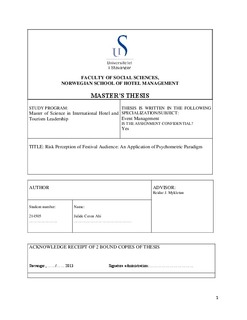Risk perception of festival audience: an application of psychometric paradigm
Master thesis

Åpne
Permanent lenke
http://hdl.handle.net/11250/185226Utgivelsesdato
2013-06-24Metadata
Vis full innførselSamlinger
- Studentoppgaver (SV-NHS) [618]
Sammendrag
The purpose of this study was to investigate the perceived risk level indicated by audiences for six contemporary hazards in an open door music festival, seeing as it is an overlooked issue in the literature. In order to measure the risk perceptions of participants The Psychometric Paradigm Model was utilized together with the perceived controllability arguments of Optimism Bias Theory.
The data was collected from 230 participants of Landstreff 2013 Stavanger through online survey in cooperation with Kongeparken. The results have illustrated that the Norwegian teenagers who participated in the survey demonstrated probabilistically correct risk estimation, in contrast to the Psychometric Paradigm’s main hypothesis. The participants pointed to catastrophic outcome and uncontrollability as the most significant predictors of perceived risk. Another important trend in the responses was the overall low risk mean ratings emerging from the study; none of the hazards stood out as having a high risk. While the general low trend in the responses was attributed to the average age of the population and trust in Norwegian society, the logical risk estimation was examined in a successful risk communication framework.
A significant aspect of the study was the perceived controllability and perceived risk association observed across the responses, implying presence of optimism bias. This finding mattered especially for the excessive alcohol consumption item considering its reported link to other hazards in the given research, providing important hints for the sector.
Beskrivelse
Master's thesis in International Hospitality Management